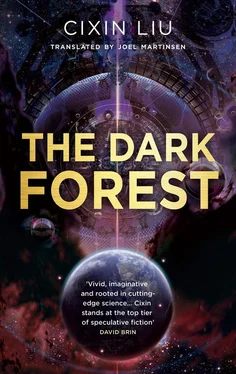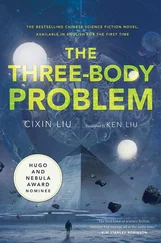“That’s a different thing altogether. In that case, heat will be a decisive factor, and the target may be melted or even vaporized. But one bomb of a few hundred million tons will probably be as big as a building, so I’m afraid it won’t be easy to score a direct hit…. In fact, the mechanical impact of nuclear weapons doesn’t measure up to kinetic weapons, their radiation is less intense than particle beam weapons, and their thermal destruction can’t compare to gamma-ray lasers.”
“But those weapons aren’t combat ready. Nuclear bombs are humanity’s most powerful mature weapons. And as for the performance issues you mention in space combat, ways can be found to improve them. Adding a medium to create a shock wave, for example, like putting ball bearings in a grenade.”
“That’s an intriguing idea. Your STEM background shows through.”
“My studies were in nuclear energy, which is why I like nuclear bombs. I’ve got a good feeling about them.”
Allen laughed. “I almost forgot: It’s ridiculous to discuss issues like this with a Wallfacer.”
The two men laughed, but Rey Diaz quickly grew serious and said, “Dr. Allen, like everyone else, you’re treating the Wallfacer strategy as something mysterious. The most powerful combat-ready weapon available to mankind right now is the hydrogen bomb. Focusing on that is only natural, isn’t it? I believe my approach is the correct one.”
The two men stopped on the quiet path through the woods they had been walking along. Allen said, “Fermi and Oppenheimer walked down this road countless times. After Hiroshima and Nagasaki, most of the architects of the first generation of nuclear weapons spent the rest of their lives mired in depression. They would be gratified if they knew the mission that humanity’s nuclear weapons are now facing.”
“No matter how frightening they might be, weapons are a good thing…. Just to let you know, the next time I come, I hope I won’t see you throwing scrap paper around. We should make a tidy impression on the sophons.”
* * *
Keiko Yamasuki woke up in the middle of the night to find herself alone, the sheets beside her cool. She got up, dressed, and went out the door. At first glance she saw her husband’s shadow in the bamboo grove in the yard, as usual. They had homes in England and in Japan, but Hines preferred his Japanese home. He said that the moonlight of the East calmed his heart. There was no moon tonight. The bamboo and his kimono-clad figure lost their dimensionality and looked like paper cuttings hung beneath the stars.
Hines heard Keiko Yamasuki’s footsteps but did not look back. Strangely, Keiko wore the same shoes in England as in Japan. Even in her hometown she never wore geta. But it was only here, never in England, that he could hear her footsteps.
“My love, you haven’t slept properly for days,” she said. Her voice was soft, but the summer insects stopped chirping and peace flooded like water over everything.
She heard her husband sigh. “Keiko, I can’t do it. I can’t think of anything. Really, I can’t come up with anything at all.”
“No one can. I say an ultimate victory plan doesn’t exist.” She took two steps forward but was still separated from Hines by a few stalks of bamboo. The grove was their place for contemplation, and the inspiration for most of their previous research had its source here. They rarely brought intimacy to this sacred place, but always addressed each other courteously, as befitted an atmosphere seemingly imbued with Eastern philosophy. “Bill, you should relax. Doing the best you can is enough.”
He turned around, but in the darkness of the grove his face was indistinct. “How is that possible? Every step I take consumes a massive amount of resources.”
“Then why not adopt this approach?” Keiko’s answer came swiftly. She had obviously been thinking about the question. “Choose a direction that, even if you’re unsuccessful, will do something beneficial while it is being carried out.”
“Keiko, that’s exactly what I’ve been thinking about. Here’s what I’ve decided to do: Even if I can’t come up with a plan, I can help other people think of one.”
“What other people? The other Wallfacers?”
“No, they’re not much better off than I am. I mean our descendants. Keiko, have you ever considered this fact? The outcome of natural biological evolution requires at least twenty thousand years to manifest itself, but human civilization has just five thousand years of history, and modern technological civilization just two hundred. That means that the study of modern science today is being done by the brain of primitive man.”
“You want to use technology to accelerate the brain’s evolution?”
“We’ve been doing brain research, and we ought to put more effort into expanding it to a scale that can tackle a planetary defense system. If we work hard for a century or two, we might be able to increase human intelligence and allow the science of the future to break out of the sophons’ prison.”
“Intelligence is a vague term in our field. What in particular—”
“I mean intelligence in the broadest sense of the word. Not just the traditional meaning of logical reasoning, but learning ability, imagination, and innovation as well. And also the ability to accumulate common sense and experience while preserving intellectual vigor. And enhancing mental endurance, so that a brain can think continuously without fatigue. And we can even consider the possibility of eliminating sleep. And so forth.”
“What will it take? Do you have even a rough idea?”
“No. Not yet. Perhaps the brain can be connected directly to a computer, which can use its computing power to amplify human intelligence. Or maybe we can achieve a direct interface between human brains and blend different people’s thoughts. Or inherit memories. But whatever avenue we ultimately take to increase human intelligence, we must first begin from a fundamental understanding of the mechanisms of the human brain.”
“And that’s precisely our area of interest.”
“We can continue in the same career as before. The difference will be that we can tap huge resources to do it!”
“Love, I’m truly happy. I’m ecstatic! There’s just one thing. As a Wallfacer, don’t you think this plan is a little…”
“A little indirect? Maybe. But think about it, Keiko. Human civilization ultimately comes down to humans themselves. If we start by elevating humans, doesn’t that make this a far-reaching plan? Besides, what else can I do?”
“Bill, you’re wonderful!”
“So think about this for a moment: If we turn neuroscience and thought research into a world engineering project, and can invest an inconceivably enormous amount of money in it, how long will we have to wait for success?”
“About a century, more or less.”
“Let’s be a little more pessimistic and say two centuries. Then the highly intelligent humans will still have two centuries left, and if they use one century to develop fundamental science and another to turn those theories into technology…”
“Even if it fails, we’ll have done what we wanted to do.”
“Keiko, come with me to the end of days,” Hines murmured.
“Yes, Bill. We certainly have the time.”
The insects in the grove seemed to have grown accustomed to their presence and resumed their musical chirping. When a soft wind blew through the bamboo and the stars in the night sky flashed through the gaps between the leaves, it was as if the insect chorus was issuing from those stars.
* * *
It was day three of the PDC’s first Wallfacer Project Hearing. Rey Diaz and Hines had spoken about the first phase of their respective projects, which were put to preliminary discussion by representatives of the PDC permanent members.
Читать дальше












